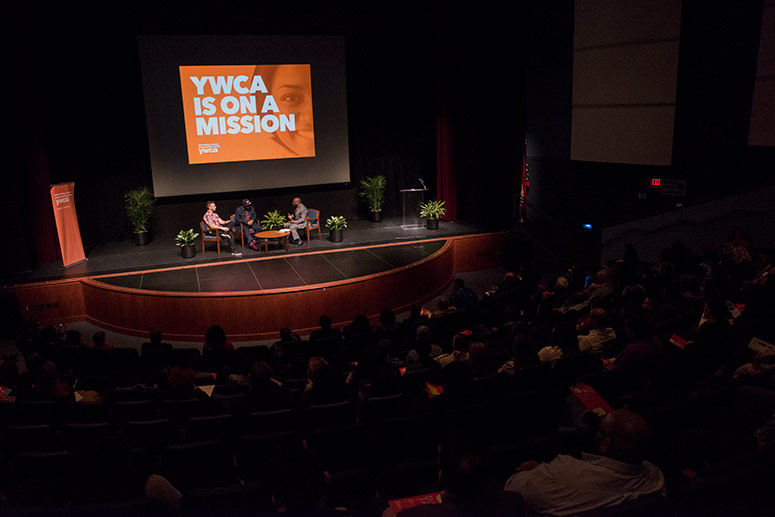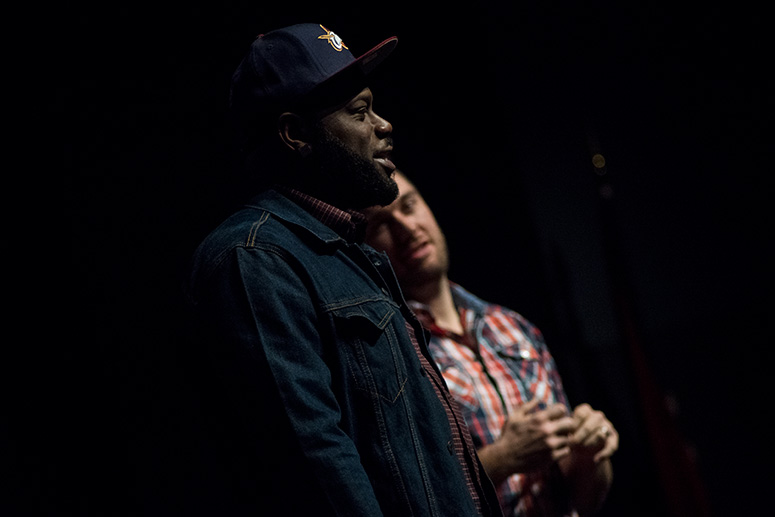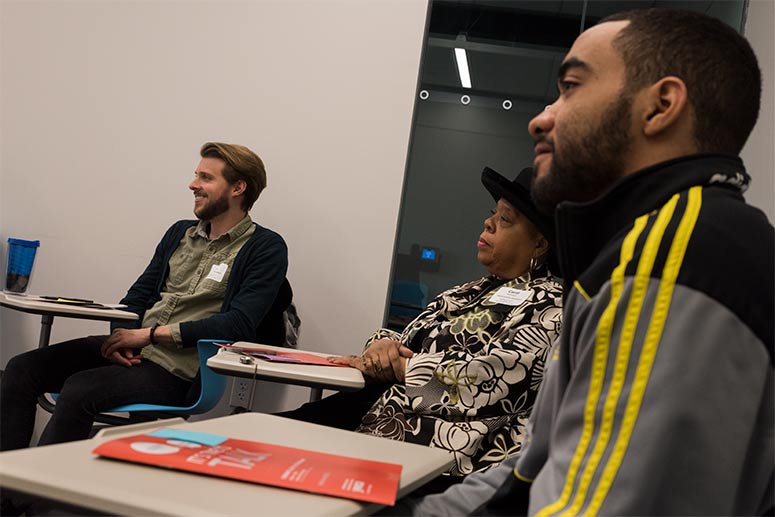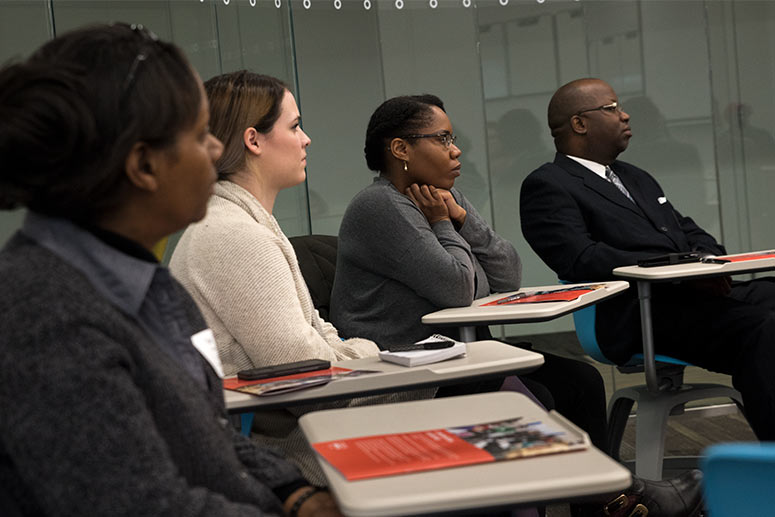Race in Cleveland: Recapping the YWCA's powerful "It's Time to Talk" forum
Images of a football player taking a knee, a Black Lives Matter protest, the Trump administration’s travel ban, and even a photo of President Barack Obama wiping a tear from his eye were the first things to meet the eye for the 300 attendees of “It’s Time to Talk”—the YWCA of Greater Cleveland’s annual forum on race.
Held last Friday, February 23, at Cuyahoga Community College’s Eastern Campus, the event kicked off with a gallery walk where attendees could post anonymous messages on sticky notes framing photographs of racial injustice. One picture depicting a DACA protestor elicited the thought, "We have to keep showing up and standing up like him." Another note on a picture of a swastika-defaced gravestone read simply, "Eradicate Hate."
 According to Heather Steranka-Petit, Manager of Learning Programs at YWCA, the goal of the gallery walk was to "engage people wherever they are comfortable about race and discriminatory issues so voices can be heard.”
According to Heather Steranka-Petit, Manager of Learning Programs at YWCA, the goal of the gallery walk was to "engage people wherever they are comfortable about race and discriminatory issues so voices can be heard.”
As for the overall goal of the event, YWCA sought to spark dialogue that could further racial understanding and cultural competency, as well as work toward eliminating barriers that foster racism and discrimination. For community activist and yoga teacher Linda D. Gaines, that left her feeling "refreshed, delighted, and hopeful. [With It's Time to Talk], YWCA is addressing societal needs and keeping attention on the pulse of what’s going on in the nation.”
It’s Time to Talk About…Forgiveness
Powerful words followed the powerful images of the gallery walk with keynote speakers Jameel McGee and Andrew Collins. In 2005, McGee was arrested on false drug charges and sentenced to prison as a result, and Collins is the former police officer who later served time for framing McGee. Both men spent time in federal prison, only to find their paths cross again while rehabilitating following their release. The two formed an unlikely friendship while working together at a coffee shop run by a faith-based employment agency.

Collins and McGee recently co-authored the book Convicted, which shares their true story of forgiveness in a racially divided society. The men walked out from opposite sides of the stage, mirroring how they came from opposite sides of life. In the keynote, both speakers stressed that society needs to get behind the YWCA's national "It's Time to Talk" movement to confront racism and bring resolution via open communication.
Even though McGee was wrongfully accused, he and Collins stressed that hope and reconciliation are possible, but only with an apology and genuine forgiveness—as well as openness to what comes next. "It’s when you come together after you have [forgiveness] and say, 'What next? What now?'" Collins told the crowd. "We understand that we stand for something a little bigger than ourselves.”
YWCA of Greater Cleveland's President and CEO Margaret Mitchell says that their message of forgiveness aligned well with the overall concept of It’s Time to Talk.
“Forgiveness is not a natural state to arrive at and can be unattainable. Harboring these feelings can cause real physical pain and is the root of the problem. It is the root of bitterness,” says Mitchell. “Playing into the hands of a white-dominated society traps people and holds them hostage.”
It’s Time to Talk About…Action
One aim of the event was to create “opportunities for conversations that move beyond the superficial”—and, by all accounts, it delivered. Following the keynote, small groups of about eight people were assembled all over the building and led by a trained facilitator to conduct The Circle Conversation—a process through which a safe space is created for people to think beyond themselves and where each voice has equal value.
 It's Time to Talk: Circle Conversation
It's Time to Talk: Circle Conversation
A talking piece constructed from buckeyes and ribbon was utilized to streamline the conversation so that only one person could speak at a time without interruption. Personal experiences with racism and discrimination were shared honestly and without fear of retribution. Some of the comments included:
“When it comes to racism, put yourself in their shoes.”
“Expose children to different communities.”
“Be friends with those that are different from you.”
“Racism is taught. Children see each other as equals.”
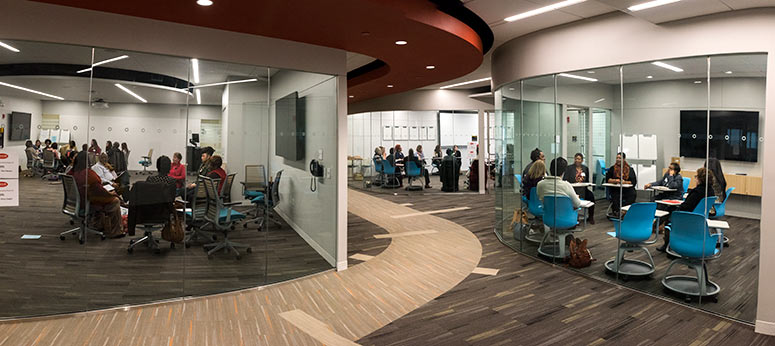 It's Time to Talk: Circle Conversation
It's Time to Talk: Circle Conversation
Education consultant Charesha Barrett served as a social justice facilitator for the second year in a row, and this year, her group included Clevelanders of African-American, Asian, Caucasian, and Indian descent. One spoke of the racism she experienced in an interracial relationship during college, while another—a nurse—talked about the discrimination she witnesses with access to treatment and medical services.
"One of the questions I asked was, 'We can talk forever, but how will we put forth action?'" says Barrett. "Most people said they would start speaking up and getting involved. Being complicit is the same as not saying anything at all; there are a lot of people who see injustices but they don’t ever speak up."
Those conversations continued during the last segment of the day, The World Café, another facilitator-led discussion with rotating small groups lasting about 20 minutes each. Steranka-Petit likens the exercise to “a speed networking session where barriers to solutions are identified, then as another group enters the discussion, they [work] to find solutions to it, but this time, with fresh eyes. Many people are stuck in their own space so this is a fun way to brainstorm ideas.”
The YWCA of Greater Cleveland is compiling the action steps that came out of The World Café and plans to publish these online in the near future.
It’s Time to Talk About…Race in Cleveland
Is Cleveland divided by race? Both attendees and YWCA representatives spoke passionately on the topic.
Mitchell maintains that one of the city's biggest issues is “significant disparities in neighborhoods and a lack of available quality education, which leads to an inability to focus on a livable wage. Urban neighborhoods are affected by environmental factors—this is not a level playing field. We must recognize when something is racist and avoid unconsciously responding with a predisposed bias.”
Director of Administration Sandra Fletcher believes there has been some progress in Cleveland, but that the city is “still racially divided by the Cuyahoga River. Younger African Americans have taken residence in Ohio City, but for the most part, there are not a lot of African Americans on the west side of Cleveland.”
 World Cafe - Facilitated discussion about action steps and community needs
World Cafe - Facilitated discussion about action steps and community needs
Barrett agrees that Cleveland is segregated, which can lead to lack of awareness about issues and inequalities people in other communities are facing. "If you don't go beyond your border, then you don't broaden your perspective," says Barrett. "This event forces people to get diverse perspectives."
Fletcher says that the It’s Time to Talk forum reassured her about Cleveland’s direction. “I was energized by how engaged everyone was in the conversations in the World Café,” she shares. “I had read Convicted [and] seen previews of the presentation online, but was still awed by the presentation. There were times I just held my breath in disbelief.”
As for Steranka-Petit, she feels there is a movement percolating in Cleveland, and that if attendees were to tell just one person about what they learned at the forum, an opportunity would be created to foster peace in our community. She adds that some participants told her that this half-day forum should be a full day of activities as they wanted to delve even deeper into this topic.
One thing is certain: a forum on race in Cleveland is needed in today’s climate and events like It’s Time to Talk not only address issues but offer achievable solutions to the racial injustices happening right here in our city.

